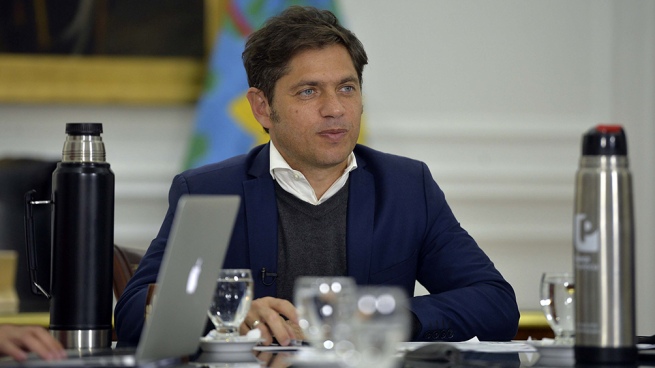The Government of Axel Kicillof held this Tuesday “the act of consensus and institutional responsibility” that made possible the approval of the 2022 Budget in the Legislature, which “allows the province to chart a course and give predictability to initiatives and fundamental works for the people of Buenos Aires.”
In this context, the governor highlighted that the approval of the initiative, which It contemplates a total expenditure for next year of $ 3.1 trillion and a request for new indebtedness of just over $ 90 billion, will allow “fundamental works for the province” of Buenos Aires.
The so-called “provincial law law” -which poses a primary deficit of $ 48.8 billion and a financial deficit of $ 133 billion- It was voted first in Deputies and then passed in the Senate, like the Tax Law, which provides for an increase in property taxes of an average 35% for most taxpayers.
In the foundations of the rule of the Executive Power, it was stressed that the role of the State will be “aimed at accelerating economic recovery” and “guaranteeing social rights and equalizing the opportunities for progress of its inhabitants.”
In that sense, today Kicillof thanked senators and deputies on their social networks for accompanying the Budget, and considered that “this act of consensus and institutional responsibility allows the Province to chart a course and give predictability to initiatives and works that are fundamental for the and the Buenos Aires “.
I thank the legislators for the approval of the Budget and the Tax Law 2022.
This act of consensus and institutional responsibility allows the @BAProvince chart a course and give predictability to initiatives and fundamental works for the people of Buenos Aires.
– Axel Kicillof (@Kicillofok) December 29, 2021
Analyzed that “The 6×6 plan focuses our priorities on the repair and transformation of the Province, on recovering the path of development, growth and employment, but above all that our people have a better life.”
In the same sense, the Buenos Aires Minister of Finance, Pablo López, said that the 2022 Budget “will allow to continue strengthening the role of the State in essential areas, such as health, security and education.”
“We will also address structural gaps in the province, with record investment in infrastructure and policies to boost production,” the official said.
“There will be no tax increase in the province for workers, merchants and SMEs”
For his part, the executive director of the Buenos Aires Revenue Agency (ARBA), Cristian Girard, affirmed this Tuesday that after the enactment of the Tax Law “there will be no increase in taxes in the province for workers, merchants, SMEs and the middle class “.
In statements made to Télam, the official explained that “in general terms, the 2022 Tax Law approved yesterday defines increases several points below inflation, that is, the vast majority of Buenos Aires will pay less than in 2021.”
“In general terms, the 2022 Tax Law approved yesterday defines increases several points below inflation, that is, the vast majority of Buenos Aires will pay less than in 2021” Cristian Girard
“It is progressive in nature, since only homeowners of more than US $ 1 million or of high-end cars with a value of more than $ 10 million will pay uncapped increases”, the head of ARBA graphed.
Investment in infrastructure
In the 2022 Budget The levels of public investment in infrastructure will be increased in all the main areas of the province, and capital expenditures in the year will have an increase of 44.1% in real terms, especially for areas such as education, security, justice and housing..
In addition, it creates 25,450 new state positions, of which 12,000 will be for the General Directorate of Culture and Education to appoint teachers and assistants; it plans to incorporate 10,000 police officers; 2,025 workers for the Ministry of Health; 1,500 for Justice; 200 for the Judiciary; 120 for the Ministry of Women and 30 for the Juan Vucetich University Institute.
The Law provides for investments in infrastructure and housing for $ 260,609 million, which implies 8.4% of the total budget. Another point has to do with the promotion of production, employment and social inclusion, with an investment that will amount to $ 123,079 million, which implies a real increase of 57% compared to 2019.
One of the fundamental policies in this regard is the School Food Service, that will have the highest investment in real terms in the recent history of the program, with $ 51,575 million, and in budgetary terms, it implies an improvement of 118% in real terms compared to the levels of 2019.
An expenditure of $ 35,333 million is expected for the educational area, $ 47,233 million for security and $ 135 billion for health
An expenditure of $ 35,333 million is foreseen for the educational area, $ 47,233 million for security and $ 135 billion for health, and the budget also includes a Municipal Fund for Strengthening of Security of $ 7,000 million.
In the session, the inclusion of a Municipal Infrastructure Fund (FIM) of $ 17 billion was agreed with the opposition, so that the communes have certain resources to carry out works.
The “Gender Perspective” is the last axis for which the government will allocate almost $ 75 billion, aimed at programs aimed at reducing the gender gap in the province of Buenos Aires.
The Tax Law, which is the one that sets the taxes that Buenos Aires residents must pay next year, was also passed early in the morning and which, according to the Buenos Aires government, “is designed on the basis of economic recovery.”
The Executive Branch specified that the rule seeks to “provide the tax structure with greater progressivity”, avoiding increasing the burden on the majority of the inhabitants of the Province and emphasizing the solidarity of the sectors with greater contributory capacity.
Thus, in the case of Gross Income, the billing amount was doubled to access differentiated rates; In addition, those monotax holders of the lowest category who enroll in the Simplified Gross Income Regime will have an exemption from the provincial tax for 12 months.
With regard to the Built Urban Real Estate Tax, to make the tax more progressive, limits are established for the growth of the tax with respect to the previous year, which amount to greater equity.
The increase in Automotive and Real Estate taxes that was voted is less than 35% for 90% of taxpayers, and in relation to the Stamp Tax, the current rates were maintained.

















